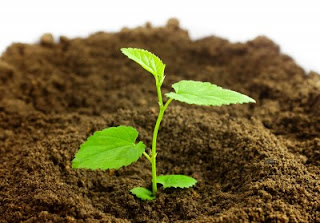 Whenever we speak about "organic farming", the specific definition of "organic" is remarkably different from the word's previous definition. Up until the middle of the twentieth century it actually specified something living or derived from living matter. In this sense, most of our food - with not too many exceptions - is organic, no matter how it is produced. Table salt, which is a mineral, is one example of inorganic food. The idea of an "inorganic fruit" is a contradiction in terms, except if it is a decorative artificial fruit.
Whenever we speak about "organic farming", the specific definition of "organic" is remarkably different from the word's previous definition. Up until the middle of the twentieth century it actually specified something living or derived from living matter. In this sense, most of our food - with not too many exceptions - is organic, no matter how it is produced. Table salt, which is a mineral, is one example of inorganic food. The idea of an "inorganic fruit" is a contradiction in terms, except if it is a decorative artificial fruit.The sense of "organic" as we use these days refers to retaining soil fertility and reliability by putting organic matter - compost or animal manure - back in the soil rather than relying on the inorganic or synthetic fertilizers that have been then generally considered the modern best alternative. So it is the fertilizers, and from them, the farming technique, rather than the food, that is "organic", and the initial point of interest was primarily with the soil, not with concerns like biodiversity or animal health. However the interpretation of "organic farming" shortly separated into different classifications from original narrow differentiation between fertilizers, as some associations of "organic producers" tried to put standards in accordance with their particular standards and needs. Some of them preferred to stay with a narrow classification as to what you could and could not add on the crops, the soil or the livestock. Some others desired to include a complete way of life, that includes healthy living, attention for wildlife, an equitable system of distribution, and so on. Amongst groups of organic farmers across the world, the broader view triumphed.
The description of organic agriculture has been settled by The International Federation of Organic Agriculture Movements:
"Organic agriculture is an agricultural system that promotes environmentally, socially and economically sound production of food, fibre, timber etc. In this system soil fertility is seen as the key to successful production. Working with the natural properties of plants, animals and the landscape, organic farmers aim to optimise quality in all aspects of agriculture and the environment. Organic agriculture significantly reduces external inputs by avoiding the use of chemical or synthetic fertilizers, pesticides and pharmaceuticals. Instead it works with nature to increase both agricultural yields and disease resistance."
But yet, without having specific criteria which could be summarized in a label that may be placed on products to indicate that they were produced organically, consumers were frequently uncertain what the different "organic" labels used by different associations and producers really meant. Also, there is a public perception that companies are ignoring important issues such as local communities or environmental and health concerns in their quest to increase profit.
Therefore the U.S. Congress and the Department of Agriculture decided in 1990 to clean up the confusion by implementing "USDA Organic" standards and a certification scheme so that people could be confident that their food certainly had been produced matching with the specifications. That led to a set of specific features that a majority of people in organic farming considered a reasonable compromise amongst the different views of what organic farming is all about. These are just a few of the regulations that apply to organic agriculture:
- Organic farming seriously restricts the use of pesticides and chemical fertilizers. Plants must be grown without the use of synthetic fertilizers; all herbicides and most synthetic pesticides are also banned. Botanical and biological ways of control can be used.

- Organic farmers rely on planting a mixture of crops and developing a healthy and fertile soil. Soil fertility is to be gathered through animal and plant waste, crop rotation, and cultivating "cover crops" - to restore nitrogen and organic matter - like clover separating other crops.
- Animals will be raised without the conventional use of drugs or antibiotics widely used in intensive livestock farming. Animals used for production of eggs, meat, or milk must also eat organic grains or other organic food and must not be given growth hormones. Sick animals may be healed with medication, but the end products cannot be sold as "organic". Organically raised livestock must have access to the outdoors.
- Genetically modified (GM) plants and ingredients are banned under organic measures. Organic food cannot be irradiated and synthetic dyes and ingredients are not allowed.
Why Buy Organic?
Shopping for organic food has never been easier, also there has never been so many choices. There is an organic alternative almost every food type. It is also common sense; organic food is good food. Good to eat, beneficial for the environment and thus, for the community, good for the smaller producers and the farm workers who produce it.
Chefs across the nation are committed to using organic foods. Organic foods allow genuine flavour to shine through, as opposed to non-organic foods that appear great but yet are often filled with E numbers and artificial flavorings and ingredients.
By supporting local growers and organic farming in your area you also support the larger community of which all of us are a part. The merits of organic food are very well attested, but the truth is it truly reduces to one concern, do you and your loved ones honestly choose to ingest bug sprays with your food? By selecting organic food you are providing the best choice for your family and also you will support the farms that grant us healthy and ecological neighborhoods.